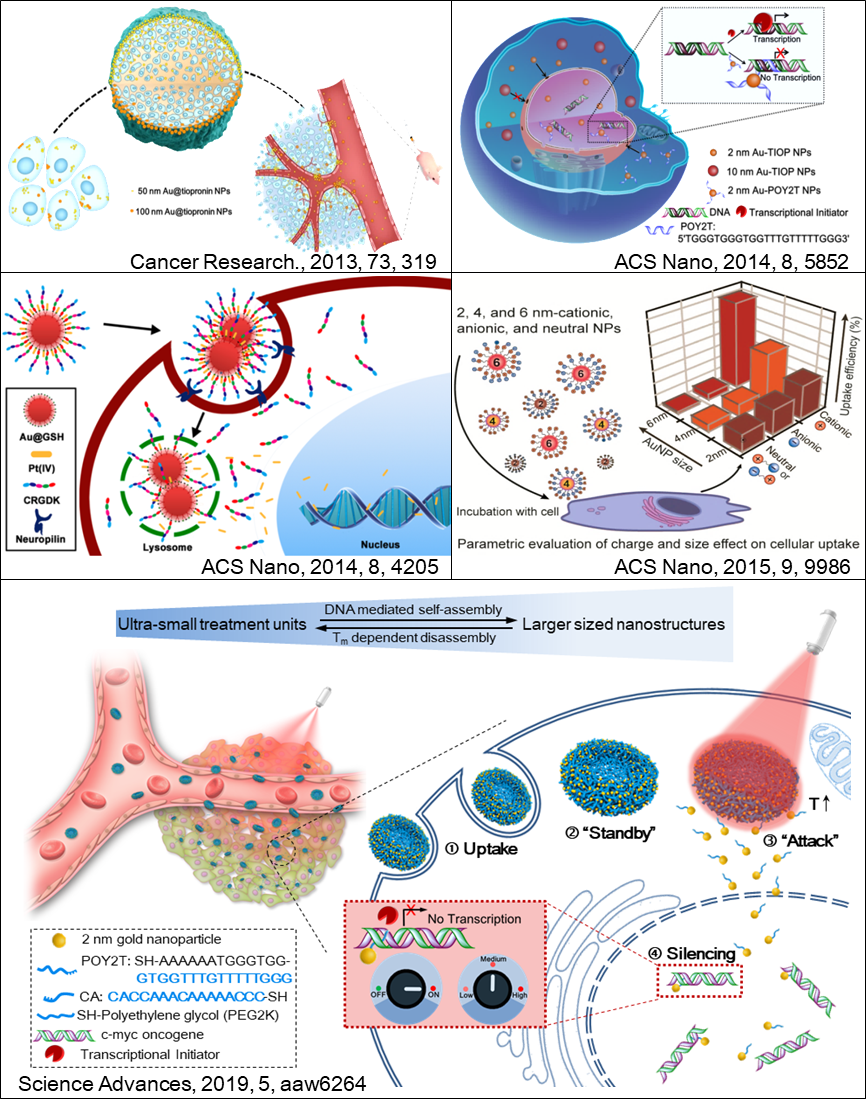The latest issue of “Science Advances” published a research article entitled with “Gold-DNA nanosunflowers for efficient gene silencing with controllable transformation”, which is accomplished by a research team led by Prof. Xing-Jie Liang from the National Center for Nanoscience and Technology (NCNST), the Chinese Academy of Sciences. This work not only provides a new strategy for constructing transformable gene interference carriers to regulate gene expression, but also contributes new evidence for the research of Au-based nanomedicine to potential clinical applications.
In recent years, Prof. Liang’s group has been focusing on the fundamental study of structure-activity relation of nanomedicine in biological systems, aiming at optimizing the drug-forming properties of nanomedicine for clinical research and applications. Previous studies from his group have shown that nanoparticles with varied size exhibited different behaviors in tumor tissues, including passive targeting, penetration, retention, internalization, etc. The relevant results further clarify the debate over “whether there are size-effects of nanomedicine in solid tumors” explored in this field for many years, providing an important guiding reference for the design of nanomedicine (ACS Nano, 2012, 6, 4483; Cancer Research, 2013, 73, 319).
Particularly, researchers from Prof. Liang’s group focused on the biological mechanism of small-sized nanomedicine, and filled the gap of the systematic studies of their endocytic mechanism, nuclear targeting, biodistribution, and metabolism, etc. The related research results have laid an important foundation for the regulation of interactions between tumor and nanomedicine (ACS Nano, 2014, 8, 5852; ACS Nano, 2015, 9, 9986; Bioconjugate Chemistry, 2017, 28, 1, 239). Furthermore, the research team has developed a series of drug delivery systems for cancer treatment, for instance, the targeted delivery of platinum drugs to prostate cancer cells (ACS Nano, 2014, 8, 4205), more efficient nuclear targeting of nanomedicine (ACS Nano, 2014, 8, 5852), and mitochondrial oxidative stress amplifier for cancer treatment (Nature Nanotechnology, 2019, 14, 379), etc.
To overcome the multiple biological barriers during drug delivery, based on the previous studies, the researchers comprehensively considered the various biological behaviors of nanodrug particles in vivo and constructed a transformable sunflower-like nanostructure for controllable gene therapy. The large-sized nanosunflowers passively target the tumor site at the first stage; With the NIR triggered transformation and shrinkage, those particles penetrate into the deeper tumor tissue and are taken up by cells. As a result, the efficient and controllable gene down-regulation is achieved, and the tumor growth is significantly inhibited. The transformable nanosunflowers provide an excellent model for the design of nanovehicles, and the system has great potential in biomedical applications (Science Advances, 2019, 5, aaw6264).
Dr. Shuaidong Huo and Ningqiang Gong are the co-first authors of this work, Dr. Shuaidong Huo and Prof. Xing-Jie Liang supervised the entire project as corresponding authors. This work was supported by the Natural Science Foundation key project, Strategic Priority Research Program of the Chinese Academy of Sciences, the external cooperation programs of BIC, the Chinese Academy of Sciences and the National Natural Science Foundation of China.
Article link: https://advances.sciencemag.org/content/5/10/eaaw6264
The latest issue of “Science Advances” published a research article entitled with “Gold-DNA nanosunflowers for efficient gene silencing with controllable transformation”, which is accomplished by a research team led by Prof. Xing-Jie Liang from the National Center for Nanoscience and Technology (NCNST), the Chinese Academy of Sciences. This work not only provides a new strategy for constructing transformable gene interference carriers to regulate gene expression, but also contributes new evidence for the research of Au-based nanomedicine to potential clinical applications.
In recent years, Prof. Liang’s group has been focusing on the fundamental study of structure-activity relation of nanomedicine in biological systems, aiming at optimizing the drug-forming properties of nanomedicine for clinical research and applications. Previous studies from his group have shown that nanoparticles with varied size exhibited different behaviors in tumor tissues, including passive targeting, penetration, retention, internalization, etc. The relevant results further clarify the debate over “whether there are size-effects of nanomedicine in solid tumors” explored in this field for many years, providing an important guiding reference for the design of nanomedicine (ACS Nano, 2012, 6, 4483; Cancer Research, 2013, 73, 319).
Particularly, researchers from Prof. Liang’s group focused on the biological mechanism of small-sized nanomedicine, and filled the gap of the systematic studies of their endocytic mechanism, nuclear targeting, biodistribution, and metabolism, etc. The related research results have laid an important foundation for the regulation of interactions between tumor and nanomedicine (ACS Nano, 2014, 8, 5852; ACS Nano, 2015, 9, 9986; Bioconjugate Chemistry, 2017, 28, 1, 239). Furthermore, the research team has developed a series of drug delivery systems for cancer treatment, for instance, the targeted delivery of platinum drugs to prostate cancer cells (ACS Nano, 2014, 8, 4205), more efficient nuclear targeting of nanomedicine (ACS Nano, 2014, 8, 5852), and mitochondrial oxidative stress amplifier for cancer treatment (Nature Nanotechnology, 2019, 14, 379), etc.
To overcome the multiple biological barriers during drug delivery, based on the previous studies, the researchers comprehensively considered the various biological behaviors of nanodrug particles in vivo and constructed a transformable sunflower-like nanostructure for controllable gene therapy. The large-sized nanosunflowers passively target the tumor site at the first stage; With the NIR triggered transformation and shrinkage, those particles penetrate into the deeper tumor tissue and are taken up by cells. As a result, the efficient and controllable gene down-regulation is achieved, and the tumor growth is significantly inhibited. The transformable nanosunflowers provide an excellent model for the design of nanovehicles, and the system has great potential in biomedical applications (Science Advances, 2019, 5, aaw6264).
Dr. Shuaidong Huo and Ningqiang Gong are the co-first authors of this work, Dr. Shuaidong Huo and Prof. Xing-Jie Liang supervised the entire project as corresponding authors. This work was supported by the Natural Science Foundation key project, Strategic Priority Research Program of the Chinese Academy of Sciences, the external cooperation programs of BIC, the Chinese Academy of Sciences and the National Natural Science Foundation of China.
Article link: https://advances.sciencemag.org/content/5/10/eaaw6264
 Close Page
Close Page- Text Size: A A A
 Printer Friendly
Printer Friendly

